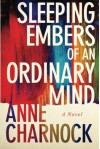Reflections
Eager reader of history, mystery, classics, biographies, steampunk, lit fic, science, scifi, and etc. My reviews are mostly positive--I rarely finish or write about books I don't enjoy. My TBR is too high for that.
Favorite books of January, part 2, three more books I loved
1) Powerful, poignant, and deep, Speak has an unusual structure, weaving together six narrative voices that together illuminate a link between the creation of artificial intelligence and the fundamental human yearning for connection. When I started the book its nonlinear format put me off, but it took just a few chapters for me to become totally hooked. The narrators include a Pilgrim or Puritan girl leaving her former life behind to journey to America, AI pioneer and WWII code-breaker Alan Turing, and a now illegal, slowly “dying” babybot--a doll of the future so lifelike and compelling that children who had one couldn’t bond with people--as it slowly loses power and memory.
I don't normally pay much attention to epigraphs, but I love Speak's. One is from Notes From Underground by Dostoevsky, while the other comes from what I think is Disney's Snow White:
“Slave in the magic mirror, come from farthest outer space, through wind and darkness I summon thee. Speak!”
2) Beautifully written and haunting in the sense that it leaves you with things to think about, Sleeping Embers of an Ordinary Mind completely captured me. Blending science fiction, art, and history, its three connected storylines span time--with one in the past, one in the present, and one in the future--but all revolve around the fifteenth century painter Paolo Uccello and his artistically talented daughter Antonia, two real life historical figures. A lot of research went into this novel, and I actually learned something about painting composition, art history and the possibilities of future technology.
3) I loved Between Mountain and Sea, and really didn’t want to leave the characters behind. Fortunately it’s the first of a sci-fi series that’s part of the Paradisi Chronicles, an intriguing multi-author project about 10 extended families who exit our devastated home world to set up colonies in New Eden, an Earth-like planet that already has native hominids. These original people are an interesting human variation, and several of them play important roles in the novel.
M. Louisa Locke, author of the Victorian San Francisco Mystery series that starts with Maids of Misfortune, is here telling the story of the Yu family, who have their roots in China. Mabel Yu was one of the original settlers and traveled from Earth as a young teenager. About 150 years later Mei Lin Yu, Mabel’s descendant, discovers Mabel’s diary, a fascinating document that tells the real history of the colony, not what Mei Lin has been taught at school. These new insights help Mei Lin question the path that’s been laid out for her, one that doesn’t suit her at all. Though Mei Lin is YA age, romance plays almost no role in the action--it’s more a coming of age book. As indicated by the title, the setting is vivid and wild, and while parts of the plot were a little predictable, I was so caught up in the world and the lives of the characters that I didn’t care.
 10
10





